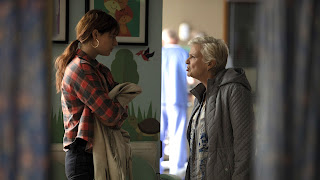In my days as a journalist I was frequently tasked
to find a Scottish angle on a national news story, the better to relate it to
our readers. This was known in the trade as ‘putting a kilt on it’ and worked
to varying degrees of success. I could see the same sort of logic at play in
Wild Rose which is, at heart, and attempt to put a kilt on The Wizard of Oz.
In this case our Dorothy is a young woman Rose-Lynn
Harlan (Jessie Buckley) who aspires to be a country music star. We meet her as
she is getting out of jail for smuggling drugs into prison and she is living in
Priesthill but, in the best X-Factor traditions,
this is merely colour in Rose-Lynn’s journey.
Rose-Lynn has a great voice – kudos to Jessie
Buckley doing her own singing – but she doesn’t really have any desire to put
in the hard yards. She doesn’t play an instrument, she doesn’t write songs, and
she has a very chippy sense of entitlement; sooner or later someone else will give
her the money to go to Nashville and stardom will follow as night follows day.
In the meantime she gets by on Harlan Howard’s quote about country music – ‘three
chords and the truth’ – and a general unwillingness to actually do anything about
her dream.
Rose-Lynn is a very passive sort of dreamer, she
has no agency in her own story. The help finally comes from the most improbable
of sources and Rose-Lynn is left to discover the same lesson as Dorothy did all
those years ago.
I don’t want to give the impression that Wild Rose
isn’t a good film, there is much to enjoy here, but it is, for me, a frequently
unsatisfying one. It is being marketed as a feel-good movie but there isn’t actually
a lot of that on display.
Rose-Lynn is not a very pleasant character. She is
selfish, entitled, ungrateful, and is generally waiting for things to be handed
to her on a plate. This makes Buckley’s performance even better because she
doesn’t shy away from the character’s inherent unlikeability. She is matched in
a less showy performance by Julie Walters as her long-suffering mother.
The music is good too and it is great to see
Glasgow’s long and deep-rooted cultural connection to country music embraced
with such enthusiasm and lack of condescension.
Gordon Steel’s cinematography brings these moments to life; there is a
transformative quality to the music and this is reflected visually in some
lovely moments.
For all that though the film feels patchy, largely
because of a script which seems to exist entirely in the present tense. No one
has a back story; least of all Rose-Lynn. With a name like that you would
assume there is country in her background somewhere. Maybe from her absent
father or possibly her mother but there is no hint of it, Rose-Lynn is a country
singer and that’s the end of it.
The story also lacks any kind of internal
consistency. The London episode is problematic– how does she function with no
money, no transport, and no means of support? Her race across the city is
barely credible and seems to happen just because it needs to. The Nashville
experience is similarly thin.
Similarly many of the other characters are simply
sketched in. Sophie Okenodo as her employer has a conversion to country so
rapid it makes St Paul seem a little sceptical. Likewise the always reliable
Jamie Sives is reduced to basically a plot device.
In the end Rose-Lynn’s redemption seems a little unearned.
It just happens because that’s what usually happens in films like this and it
would look odd without it.
There is still a lot to like in Wild Rose but, for me, it doesn’t quite land.
It should however be celebrated as different kind of film from this part of the
world and a welcome break from Scottish miserabilism.
And if anyone out there hasn’t seen the BBC’s War and Peace, The Last Post or The Woman in
White, and is in any doubt about Jessie Buckley’s ability, take it from me
this woman is a major talent.






No comments:
Post a Comment